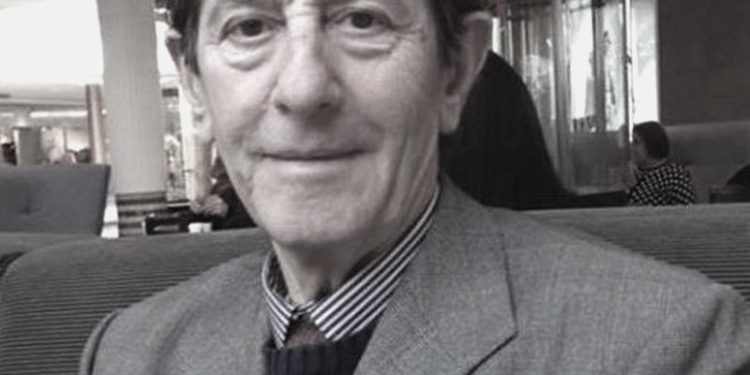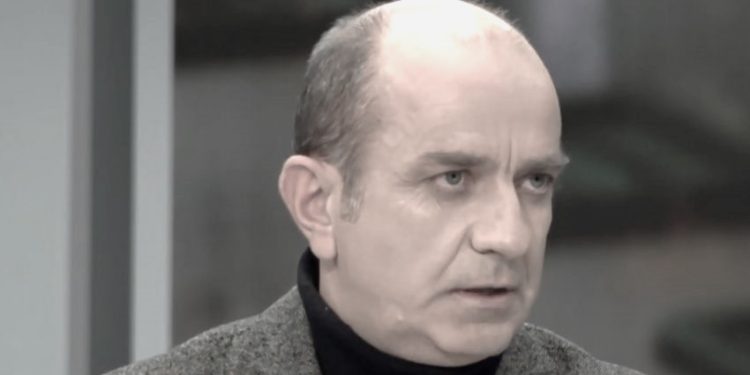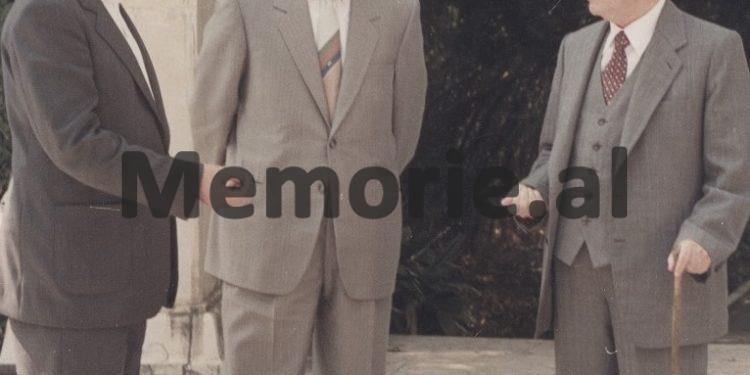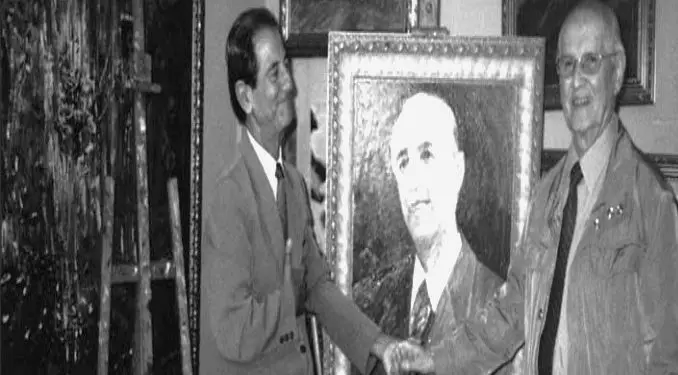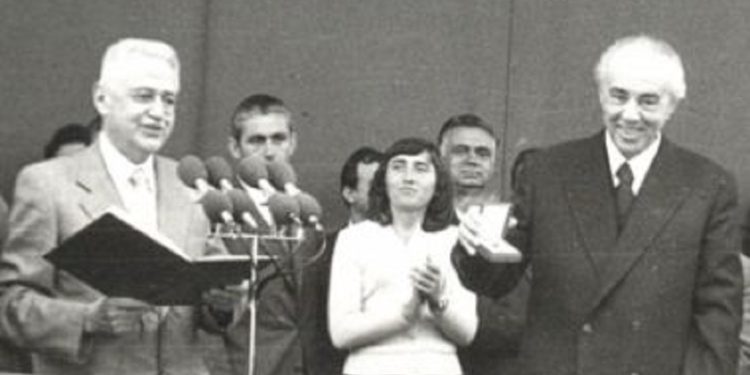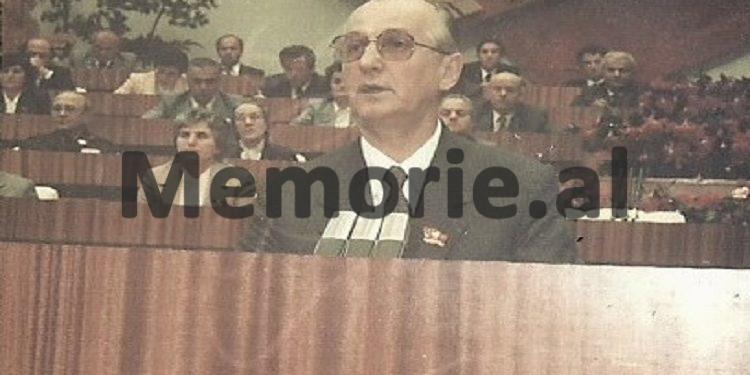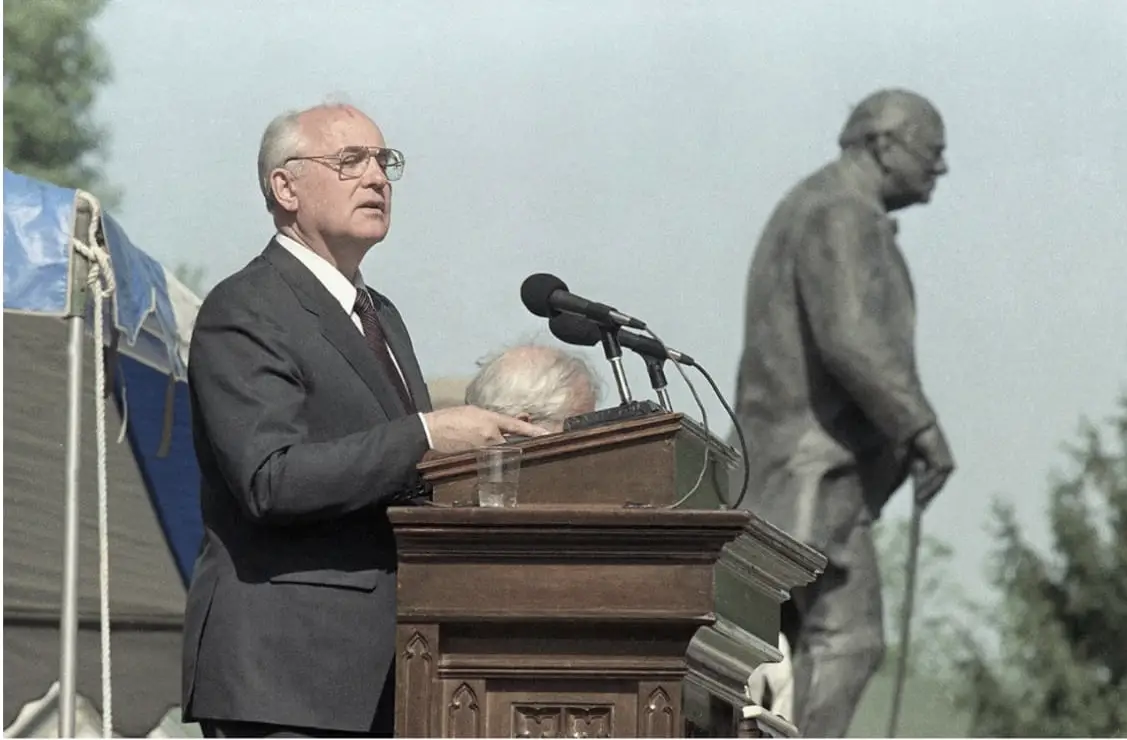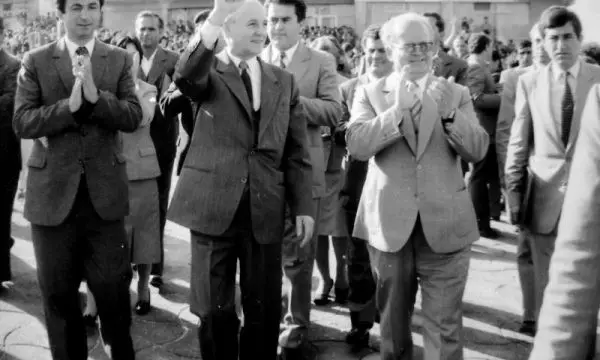By Aristir Lumezi
Part One
Memorie.al / Ramiz Alia’s former personal secretary, Guro Zeneli, in a long interview sheds light on the communication of the former senior leader of the Party of Labor of Albania with Mikhail Gorbachev, regarding the strategy decided at the meeting of communist parties in Katowice, Poland. According to Zeneli, Ramiz Alia, once a student at the Faculty of Philosophy in Moscow with Gorbachev, although he was invited to participate in this meeting, did not go, but he was sent to Tirana the material of this meeting and the decisions taken there. Zeneli, who was close to Ramiz Alia until the last moments of his life, says that after Ramiz was introduced to Gorbachev’s document, he discussed it with Foto Çami and began a deep reflection based on it, toning down the class struggle, the accusations against religion, the lack of defense of Stalin’s figure and discussing more openly about the market economy.
Ramiz Alia, according to Zeneli, in continuation of his strategy for opening Albania, sent two of the best economists of the time, Fatos Nano and the late Gramoz Pashko, to Germany and Sweden, to study the way to adopt the Albanian economy to a market economy.
Mr. Guro, when did you start working in Tirana at the Presidium of the People’s Assembly?
I came in 1982, after a suggestion that Jashar Menzenxhiu had made to the chairman of the Presidium of the People’s Assembly, Haxhi Lleshi.
How was it working with Haxhi Lleshi?
Haxhiu was a man of habit, traditional, of his word, not at all negative, a man with a great reputation in Dibër, the war generation, but also beyond, a man who helped people. Once when he was going to Dropull, Haxhiu asked me to prepare a material, a speech that he would deliver there in front of the people. And he said to me; prepare it for me, because you have worked in that area and know it well. I prepared the material and gave it to him. When we went there, there was a very good reception. The speech that I had prepared for Haxhiu, I also gave to the chairman of the Dropull cooperative, who was also a member of the Assembly. I asked him to make some corrections. He made some corrections and returned it to me.
(There was a message from Enver Hoxha that in all speeches, the minority should not be criticized, that the minority should not be punished for small things, while another person who was not a minority, for the same mistake at work, would be fired. Enver had also given a message for the Shkodra area, that there should be no irritation with the people of this area, or excessive punishments. And I have confirmed this in Saranda. Jashar Menzelnxhiu created a very good relationship between the minorities in Saranda, the Chams and the Albanian population, who had their own burdens). But let’s go back to the visit to Dropull, Haxhiu read the first version, but he could not read because age also took its toll. The chairman of the cooperative says to me: Hey Guro, didn’t you read that speech that we prepared together?! I justified it a little with age. The chairman of the cooperative says to me: You couldn’t find someone else to read the speech, but Haxhiu, who can’t read…?!!
How many years did you work with Haxhi Lleshi?
I worked for a little over two years. When I started working with Haxhi Lleshi in February, I stayed for about a year without going home, my family was in Saranda. At one point my mother got sick and I asked her for permission to go and see her. She gave me permission and I went. When I met my mother, she said to me in a whisper: “Where are you, mother?! It’s good that you didn’t miss me, but you didn’t miss your wife and four children either”?! My mother asked me what work I do with Haxhi and I told her that I write to her, I help her with his work; I described some of the tasks I performed. “You were an aga in Saranda, what did you want that you went and became Haxhi’s employee in Tirana”?! My mother said to me.
Then Ramiz Alia came…?
Yes, I worked with Ramiz, after Haxhi Lleshi retired. With the arrival of Ramiz in the People’s Assembly, the situation in the institution immediately changed and in the public opinion it was seen as a more open institution. Ramiz had a different communication, both with the institutions and with the people. While Haxhiu, had remained there for decades. He was the generation of those who had participated in the war, who sought offices and could not be moved from their posts and stayed there until they got sick. But even when they got sick, the offices and privileges continued, until they died. But Ramiz was special. On the first day of work that he came to the Presidium of the People’s Assembly, Ramiz invited me from his house. “Come – he said – let me introduce you to the family”. He also took me to lunch that day. I will never forget his simplicity and humanity. Ramiz asked that there be no official framework in his relations, I was the closest person to him at work.
“Katovica”, the meeting called by Gorbachev, the Soviet leader of the 1980s, with the leaders of the former communist countries, has been treated time and time again as a model from which pluralism in Albania began. Those of you who have worked with Ramiz Alia, are you aware of any such document that Alia received from Gorbachev?
I know that Ramiz Alia received a letter from Gorbachev. Gorbachev had sent this letter to all the first secretaries of the communist countries of the East, to participate in this meeting.
Did Ramiz Alia and Gorbachev go to school together?
They went to a university in Moscow for Philosophy. They were not in the same course. Ramiz Alia, and why did he receive Gorbachev’s letter, did he not physically go to Katowice?
When was the Katowice meeting held?
The Katowice meeting took place in 1987. Although Ramiz Alia did not go to Katowice and did not participate in that meeting, Gorbachev’s letter arrived in Tirana, which contained the conclusions of this meeting, on how the former communist countries should be opened to democracy and a market economy. Ramiz himself stated that he received a letter from Gorbachev.
How did you come across the letter that Gorbachev sent to Ramiz Alia?
I did not receive it, but I saw it on Ramiz Alia’s desk. Later I obtained a copy of it, translated into Albanian. As soon as he became acquainted with Gorbachev’s letter, Ramiz set to work to implement it. Why do I say this, because the first work that was done was to moderate some terms that were essential to the system. The word “revolutionization” was removed from circulation, being replaced by “democratization”. Ramiz called some of the people in the apparatus and gave us instructions that in all the materials that would be written, speeches, etc., the word “revolutionization” should be replaced with the word “democratization”.
When did this happen?
This happened around 1987, when Gorbachev’s letter arrived.
Did Ramiz consult with other secretaries or members of the Politburo?
I know that he consulted with Foto Çami, who was one of the most cultured and visionary people in the Central Committee. He was more open-minded. Ramiz consulted with Foto a lot, because he appreciated his capacity and open mentality. Foto got upset with Ramiz once.
Why, what happened?
After consulting with Ramiz, for a meeting that Foto was going to have with intellectuals in Tirana, the artists had determined what lines they would stand on. And Ramiz had given the idea of a more moderate, non-dogmatic articulation and of letting intellectuals express themselves about the opening of the country, the opening of the party, but with care that this did not come from the people of the Party, but came out as a request from intellectuals. During a long conversation with the artists, Foto did not openly express himself about pluralism, but “cheered” at the idea of democratization, but without getting into the concept and why he himself was part of this idea, after consulting with Ramiz.
“Why didn’t comrade Ramiz tell me, so that I could tell the artists, because they asked me if the Party was open to pluralism and the creation of other parties, and I didn’t know what to tell them,” Foto addressed Ramiz, and I saw that he was touched by this. A few days later, Ramiz went to a meeting with students and openly stated that he was for pluralism and free speech. For this, Foto was upset that he himself had not declared the idea of pluralism in the meeting with the artists, but had hesitated. In fact, at that time, all these meetings with intellectuals and artists were intended to test the intelligence, how prepared it was to accept pluralism and pluripartism, but without creating excesses of violence. Ramiz wanted at all costs to avoid a clash among the people.
Did Ramiz Alia discuss Gorbachev’s letter with the Party Bureau?
Yes, he gathered the Political Bureau of the Central Committee of the Albanian People’s Party, mostly with the conservative part of the Bureau, and explained that Albania had to be opened up to a market economy, because our economy was at a point of crisis.
Were there any reactions from the old Party members?
It was the period when Ceausescu was executed in Romania and this had created quite a stir.
What reactions did members of the Political Bureau have about “Glasnost” and “Perestroika”?
“Glasnost” was about allowing free speech, open discussion and transparency. While “Perestroika” was about opening up to a market economy. In reality, Ramiz, years before the democratic changes came, sent Fatos Nano, a well-known economist of the time, to Germany to get to know the free market economy in practice and in what forms it could be adopted in Albania, in the conditions of the Albanian economy. Nano prepared a scientific material on the market economy, which Ramiz accepted, and even thanked him for the good work he had done. It was this material that stimulated Ramiz’s interest and opinion on Nano, to later appoint him as Secretary General of the Council of Ministers, Prime Minister and later to propose him as chairman of the Socialist Party.
Ramiz also sent Gramoz Pashko to Sweden, who did not bring any written material, for this experience-gathering visit. Gramoz Pashko even released all the figures of the Albanian economy to the public, during his stay in Sweden, as if he were the country’s prime minister. We have learned of his statements through the “Agence”, which came to the People’s Assembly. Ramiz told me; warn Gramoz about what he has done, but not as if I had ordered him, but on your part…! While as for your question, some of the bureaucrats were for the changes. At a party organization meeting, where Ramiz Alia was also a member, it was the organization of the administration of the Propaganda sector, of the Central Committee…!
Were you a member of this organization?
Yes, yes, I was a member.
Who led that organization?
He was a very good man, Leka Shkurti. It was the time when Gorbachev’s ideas about Glasnost and Perestroika were discussed. In 1985, Gorbachev had come up with the theory of Perestroika, a reconstruction of the socialist system, a revolution that would come from above, from the party leadership, to make rapid democratic reforms, which would modernize socialism up to that time. It would allow more freedom, release and stop the persecution of political dissidents, allowing the creation of democratic groups and movements, the separation of the state from the party and the making of some economic reforms, starting from allowing private property, etc. At one of the organization’s meetings, Ramiz asked its members what they thought about Perestroika and Glasnost.
In fact, before the organization meeting, Leka, as an open person who quickly caught the spirit of change, had told me that we would support Ramiz, on the issue of reforms and Glasnost, that we have nowhere else to go. This will be realized. “Let me ask you, my friends, and you, Mehmet (Mehmet Elezi, who was the head of the press), what is your opinion on this Glasnost? Does our intelligentsia love it, accept Glasnost or not?” Ramiz, who was careful, did not express whether the intelligentsia of that time wanted free speech, but used Gorbachev’s term, do they support Glasnost or not? It was Ramiz’s philosophy to give things gradually and not with a strong punch and revolution. This was Ramiz’s intelligence, in that terrain that he had to work to change things.
What answer did Ramiz get from this test?
No, Mehmet said, no way, our intelligentsia in no way accepts Glasnost. Ramiz asked me too; what do you think about Glasnost, do our intellectuals welcome it? I actually spoke openly with Ramiz, because I knew that I would not have any ill will towards him, plus I had also spoken with Leka Shkurti before, that Ramiz should be supported in what he was going to propose and discuss. I told him that; our intellectuals love free speech. Ramiz told me; don’t talk about Glasnost, I said no, about free speech. Mehmet jumped up. No, Mehmet said, they don’t accept it; we will create a bad reaction. You stay Mehmet Elezi, Ramiz told him, because you know very well Guroja… what you are talking about.
In fact, Mehmet Elezi was a little annoyed with Ramiz, for the way he opposed him at the organization’s meeting. At the end, Ramiz spoke, saying that until now, we have had the term “revolutionary” in our vocabulary and work, now times have changed and we do not have to remain with those terms and actions that time has left behind and require new findings from us. We must democratize the life of the country and not revolutionize it, as we have had until now. At the meeting of the organization, Ramiz gave an order to no longer deal with the theses, according to which, religion is opium for the people. Stop criticizing religious beliefs. We were even given a taxing order by Ramiz, that the ALP magazine “Rruga e Partisë”, should no longer deal with issues of religion, with Stalin, that we should no longer take him under our protection.
When were these theses put forward?
It must have been 1988, before the events in Romania. The order was even given to work with the people for the democratization of the life of the country. There was a debate at that time about the statue of Stalin. It was Sofo Lazri who said; “his own people don’t love him, why should we protect him”?! This statement by Sofo did not create any reaction, as there were signs of a kind of softening of dogmatic positions. It was the time when Ramiz announced the thesis of opening the party. At that time, I also wrote one as a joke; “Mother Party retires, with many children”. And some said to me; Hey Guro, what are these?!!!
There were rumors that the busts of Stalin and Lenin were removed by the party leadership during the night. Is it true?
It is true; the busts were removed at night, by our order. Who could remove the busts of Stalin and Lenin, if we did not want them?! Can you imagine?! Thus, the bust of Stalin was removed at night without making any noise and without anything, by a group of builders, by order of the leadership. They were ordered by the leadership. Then the bust of Lenin was quietly removed. Ramiz had a problem; he demanded that the busts be removed, that their time had run out. Once, Ramiz even said to me in the audience: “We are running out of time, not the busts”! The bust of Stalin was also removed from the “Stalin” Textile Combine. Ramiz removed them tactically and gradually. He gave orders at night to demolish the busts and during the day he said: “Oh, they have removed this bust too. They have removed that bust too?! What is this?”?! Now heroes emerge.
Were there open or secret reactions to this softening of Ramiz and theses on democratization?
At that time, it was said that Ramiz betrayed Enver, on the party line. The members of the Politburo discussed this with each other, but not in official meetings. Memorie.al




